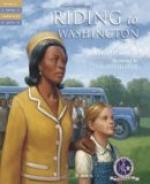“But how do you know that she is not a Roman remain?” I asked. “Nobody can tell a woman’s age. She may even be a solar myth.”
Say what I might, I could not induce Halifax to join in “the quest of Throppes wife”; it savoured too much of quixotry for sober-minded Halifax.
I now realised that the quest must be a solitary one, and I consoled myself with the thought that, if the ardours of the pilgrimage were unshared, so would be the glory of the prize. Fired with new enthusiasm, I shouted the name of Throp’s wife to the everlasting hills, and the everlasting hills gave back the slogan in reverberating echoes—“Throp’s wahfe.” By midday I had reached the summit of Stanbury Moor, and the question was whether I should descend the populous Worth Valley to Keighley or strike northwards across the hills. Instinct impelled me to the latter course, and instinct was right. Late in the afternoon, faint but pursuing, I reached a hill-top village which the map seemed to identify with a certain Cowling Hill, but which was always spoken of as Cohen-eead.
I made my way to “The Golden Fleece,” and there, in the bar parlour, I met an old man and a merry. His face was as round and almost as red as a Dutch cheese, and many a year had passed since he had last seen his feet. I felt drawn to this old man, whose baptismal name was Timothy Barraclough, but who always answered to the by-name of Tim o’ Frolics; and when we had politely assured one another that it was grand weather for the hay and that lambs would soon be making a tidy price at Colne market, I spoke to him of the quest.
At first he remained silent, but after a few moments his blue eyes began to twinkle like stars in the firmament, and then, slapping his knees with both hands, he broke into an uncontrollable fit of laughter.
“Ay, ay,” he said, “I know all about Throp’s wife. Shoo lived at Cohen-eead, an’ my mother telled me t’ tale when I were nobbut a barn.”
As I heard these words, I almost leaped for joy, and could have thrown my arms about the old man’s neck, and embraced him. Remembering Pudsey, however, I refrained, but urged Tim o’ Frolics to tell me all he knew.
“Throp was a farmer,” he began, “and lived out Cornshaw way. He was a hard-workin’ man, was Throp, but I reckon all his wark were nobbut laikin’ anent what his wife could do. You see, her mother had gien her a spinnin’-wheel when shoo were wed, and eh! but shoo were a gooid ’un to spin. Shoo’d get t’ house sided up by ten o’clock, an’ then shoo’d set hersen down to t’ wheel. Throp would sam up all t’ bits o’ fallen wool that he could find, an’ Throp’s wife would wesh ’em an’ card ’em an’ spin ’em into yarn, an’ then shoo’d knit t’ yarn into stockin’s an’ sell ‘em at Keighley an’ Colne. Shoo were that thrang shee’d sooin getten shut o’ all t’ wool that Throp could get howd on, an’ then shoo axed t’ farmers to let t’ barns out o’ t’ village go round t’ moors




